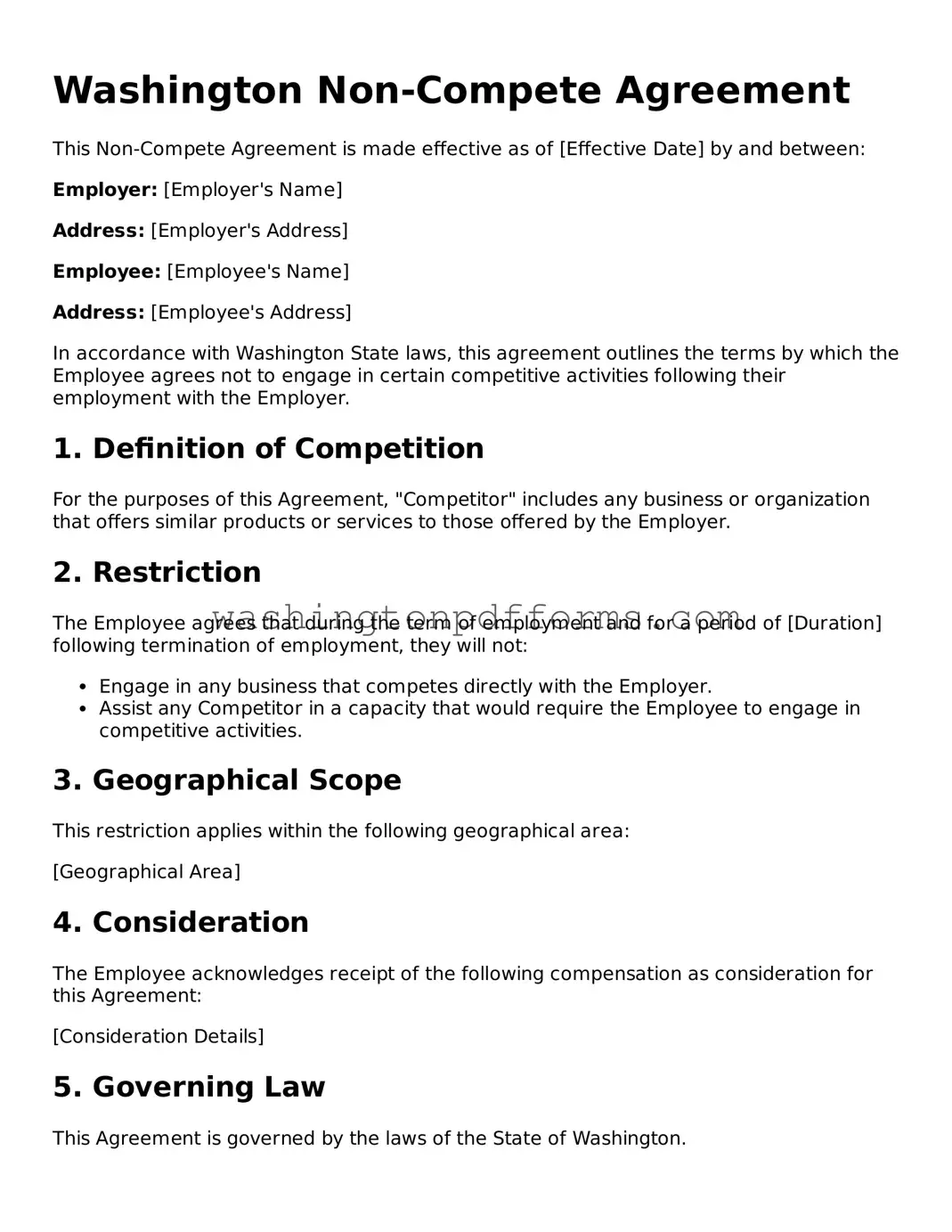Attorney-Approved Washington Non-compete Agreement Template
In Washington State, a Non-compete Agreement can play a crucial role in protecting a business's interests while also outlining the rights and responsibilities of employees. This form typically includes essential elements such as the duration of the non-compete period, the geographical area it covers, and the specific activities that are restricted. It is designed to prevent employees from taking sensitive information or trade secrets to competitors after leaving a job. Understanding the nuances of this agreement is vital for both employers and employees. Employers must ensure that their agreements are reasonable and enforceable, while employees should be aware of their rights and the potential limitations on their future job opportunities. Clarity in the terms of the agreement can help avoid disputes down the line, making it an important document for both parties involved.
Common mistakes
Completing a Non-compete Agreement in Washington can be a complex process, and individuals often make critical mistakes that can undermine the effectiveness of the agreement. One common error is failing to understand the scope of the agreement. Many individuals do not realize that non-compete clauses must be reasonable in duration and geographic scope. A vague or overly broad agreement may not be enforceable in court.
Another mistake involves neglecting to specify the consideration provided in exchange for signing the agreement. In Washington, there must be a legitimate reason for the non-compete to be enforceable, such as a job offer or a promotion. Without clear consideration, the agreement may be deemed invalid.
People also frequently overlook the importance of clarity in the terms of the agreement. Ambiguous language can lead to misunderstandings and disputes down the line. It is crucial to define key terms, such as what constitutes a “competitor” or what types of activities are restricted.
Many individuals fail to consult legal counsel before signing the agreement. This oversight can lead to unintentional acceptance of terms that are unfavorable or overly restrictive. Seeking legal advice can help ensure that the agreement aligns with an individual’s career goals and rights.
Another common error is not considering the implications of the agreement on future employment opportunities. Individuals may sign a non-compete without fully understanding how it could limit their job prospects in the future. This lack of foresight can have long-term consequences on career advancement.
Some people also make the mistake of not keeping a copy of the signed agreement. Having a personal copy is essential for reference and can provide clarity if any disputes arise regarding the terms of the agreement later on.
Lastly, individuals sometimes ignore the requirement to review the agreement periodically. Circumstances can change, and what may have been reasonable at the time of signing could become overly restrictive later. Regularly reassessing the agreement can ensure that it remains fair and enforceable.
Similar forms
- Non-disclosure Agreement (NDA): Like a Non-compete Agreement, an NDA protects sensitive information. It prevents employees from sharing confidential business details with competitors or unauthorized parties.
- Cease and Desist Letter: If you need to formally demand that an individual or organization stop harmful actions, consider using a specific Cease and Desist Letter template tailored for this purpose.
- Non-solicitation Agreement: This document restricts a former employee from soliciting clients or employees of the company. It aims to protect business relationships, similar to how a Non-compete Agreement protects market interests.
- Employment Agreement: An Employment Agreement outlines the terms of employment, including duties and responsibilities. It often includes clauses that may reference non-compete obligations, ensuring clarity on expectations.
- Confidentiality Agreement: This document ensures that employees keep proprietary information private. While the focus is on confidentiality, it shares similarities with Non-compete Agreements in terms of protecting business interests.
- Partnership Agreement: A Partnership Agreement defines the roles and responsibilities of partners in a business. It may include non-compete clauses to prevent partners from competing against each other after the partnership ends.
Some Other Washington Templates
Washington State Articles of Incorporation - This document protects owners by limiting personal liability for debts.
The process of filling out a Business Credit Application can be streamlined by utilizing resources available online, such as those found at smarttemplates.net, where businesses can find templates and guidance to ensure accuracy and completeness in their submissions.
Small Estate Affidavit Washington Pdf - The affidavit is a method for heirs to manage an estate with minimal hassle.
Pay or Vacate Notice - Tenants should carefully read the notice to identify any necessary actions.
